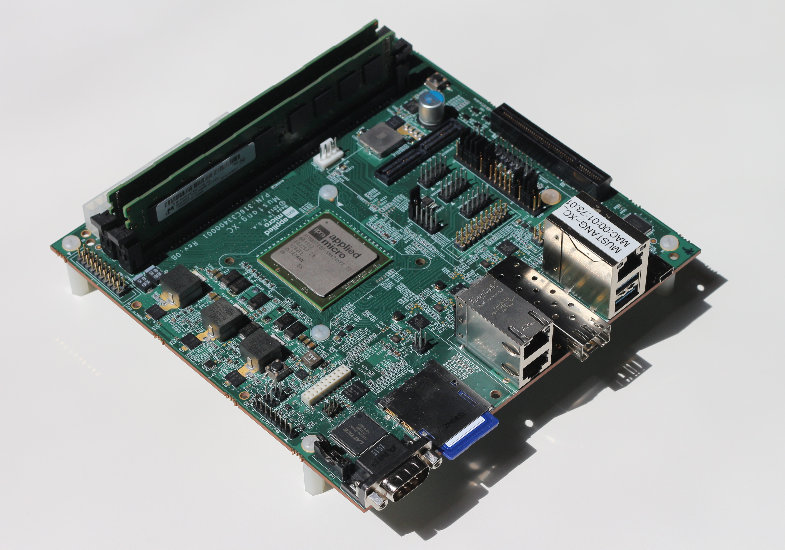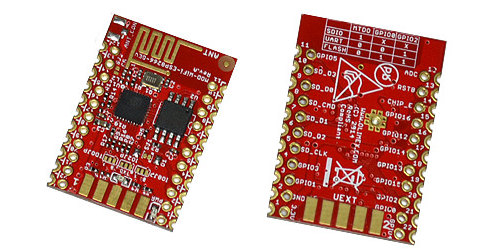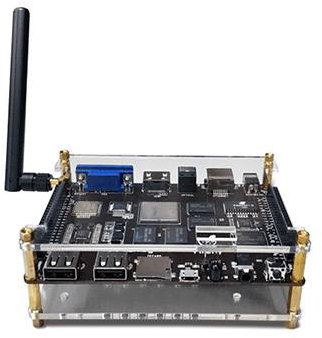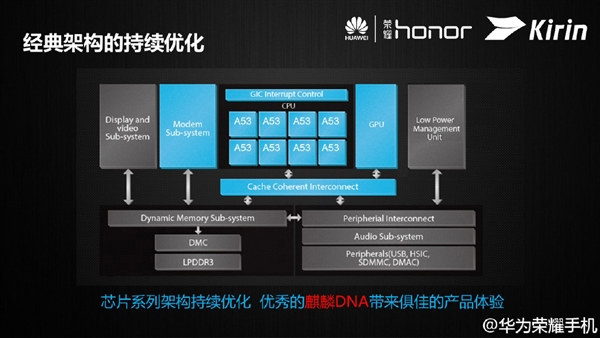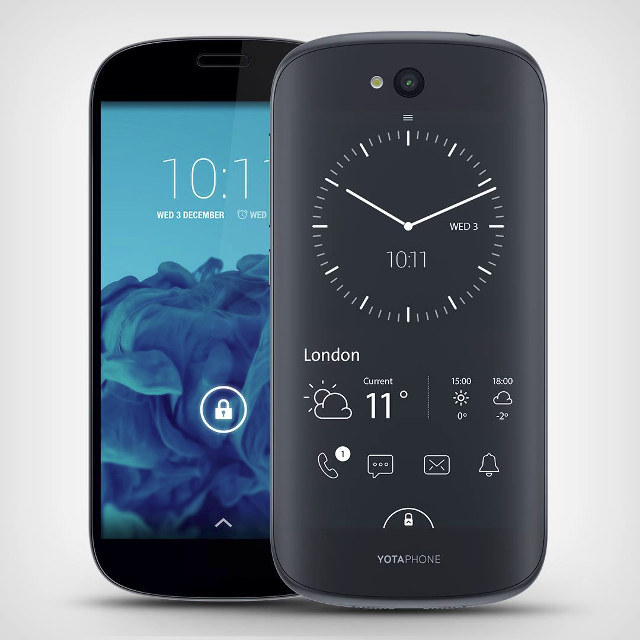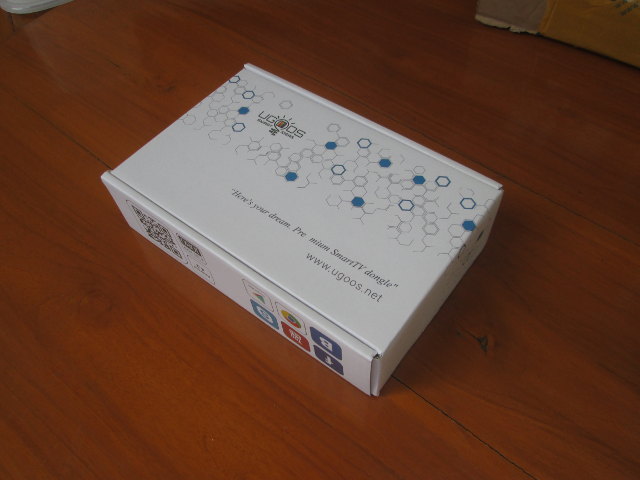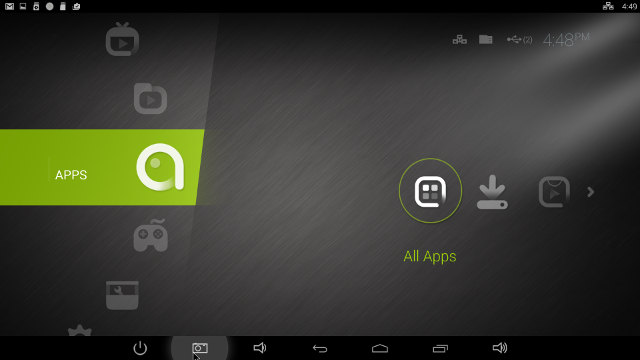SGET (Standardization Group for Embedded Technologies) had previously released system-on-module standards such as Qseven and SMARC. The group has now published the new “embedded NUC” (eNUC) standard around NUC (Next Unit of Computing) developed by Intel, that defines mechanical and basic technical parameters for multifunctional, small sized and cost effective embedded computer boards. The standard specifies both required and optional features. Minimal requirements are summarized as follows: PCB outline & PCB mounting concept – 10.16 x 10.16 cm (4 x 4 “) board. Other dimensions as shown above. PCB and connectors height are also defined, respectively with 18.6 mm and 24.25 mm maximum heights. Predefined Board Types with minimum interface and feature set: Type 1 (Basic) – At least 1x LAN, 2x USB. and an external single power connector. Recommended features include video out (HDMI, DP,…), 1x SATA, 1xSD slot, audio interfaces, mini PCIe, etc… Type 2 (Connectivity) – At […]
Applied Micro XC-1 Server Development Board (Mustang) is Now Available to Developers for $895
64-bit ARM server boards such as Applied Micro XC-1 Mustang and AMD Opteron A1100 development kit have been available since the beginning of the year, but only to selected companies, and at a price of several thousand dollars per board. Applied Micro is now offering their X-Gene based XC-1 development board to individual developers for $895, or about ~40% discount to the $1495 company now have to pay for the board. It may also be available from distributors (part number: EV-883208-X1-PRB-1). XC-1 board (codenamed Mustang) technical specifications: SoC – Applied Micro X-GeneAPM883208-X1 8-core ARM 64-bit @ 1.6 GHz System Memory – 2x DDR3 UDIMM memory slots up fitted with 2x 4GB sticks (8 GB), upgradable to 16GB Storage – 1x 128Mbit SPI NOR Flash for booting, 1x SATA 3 ports, SD card slot, 1024Kb and 256Kb I2C EEPROM Connectivity – 2x Gigagit port (SGMII), 10 GbE SFP+ cage, 1x Gigabit […]
Olimex Introduces Open Source Hardware ESP8266 Wi-Fi Modules, Evaluation Board Coming Soon
ESP8266 has become popular as module based on this SoC make it incredibly cheap to add Wi-Fi to all sort of things, the SDK available, and a community has gathered around the solution. Olimex has jumped on the bandwagon, and is now provided two open source hardware ESP8266 modules: MOD-WIFI-ESP8266 which makes it easy to interface to other Olimex boards thanks to its UEXT connector, and MOD-WIFI-ESP8266-DEV with two rows of 0.1″ connectors and an unsoldered UEXT pad, is better suited if you want to integrate it with your own baseboard, or experiment with a breadboard. An evaluation board called MOD-WIFI-ESP8266-EVB will be launched a little later. Both modules share most specifications: SoC – Espressif Systems ESP8266 32-bit RISC processor with 802.11 b/g/n support(32-pin QFN package), Wi-Fi – 802.112 b/g/n with WEP, TKIP, AES, and WAPI engines, Wi-Fi direct (P2P), and soft-AP. On-board antenna and u.FL connector Expansion MOD-WIFI-ESP8266 – […]
Free Firefly-RK3288 Boards Available to Developers
Firefly-RK3288 is a development board powered by Rockchip RK3288 processor, and for a board that’s just gone into mass production, I have written about it often enough, so I won’t go into specifications details, Android & Linux SDK, and schematics availability. T-chip has now launched a developer program to give away the board to people with interesting projects. The board normally costs $160 shipped, but if you are selected all you’ll have to pay is shipping. In order to apply for this contest, send an email to apply@t-firefly.com with the following information: Name, country/region Personal website/blog, and projects (better with project homepage) Usage/project plan of the board You have until December 5, 2014 to apply. Good luck 🙂
Huawei Introduces Kirin 620 Octa Core Cortex A53 LTE SoC for Smartphones
Huawei / Hisilicon has announced a new 64-bit ARM processor with Kirin 620 featuring eight ARM Cortex A53 cores coupled with a Mali-450MP GPU, as well as an LTE Cat4 modem. Key specifications of this application processor include: CPU – 8x ARM Cortex A53 @ 1.2 GHz GPU – Mali-450MP4 GPU Memory – LPDDR3 Camera – 13MP, ZSL (Zero Shutter Lag), HDR Video – Decode & Encode: 1080p30 H.264 Cellular connectivity – LET Cat4 150M/50M, HSPA+ Cat24 42M / Cat6 5.76M, TDS R7 2.8M/2.2M, GSM R6 Class33 Voice Solution – VoLTE/eSRVCC, CSFB, SGLTE, DSDA, DSDS Peripherals – USB, HSIC, SD/MMC, DMAC Process – 28 nm That’s about all I know so far. Hisilicon mobile SoCs have not found their way in many handsets in the past, apart from Huawei smartphones. We’ll see if that one becomes more popular. Via AndroidPC.es and Android Headlines.
Yotaphone 2 Smartphone Features an Improved AMOLED + ePaper Dual Display
About two years ago, Yota , a technology company based on Russia, introduced the Yotaphone, an Android smartphone with an innovative dual display solution comprised of a standard color display on the front, and an E-ink display on the back, in order to extend battery life. The idea was interesting, but the phone did not look that great. But with Yotaphone 2, the company upgraded the processor with a Snapdragon 800 processor, a larger 5″ display, and if the back ePaper display looks as crisp and clear in real life as in the picture below, you could have a winner, and copycats will eventually show up. Yotaphone 2 specifications: SoC – Qualcomm Snapdragon 800 quad-core Krait processor @ 2.2 GHz with Adreno System Memory – 2GB RAM Storage – 32GB eMMC Displays Front – 5″ AMOLED touch screen, 1920×1080 resolution,16M colors, 442ppi, with Corning Gorilla glass 3. Rear – 4.7” […]
Unboxing of Ugoos UM3 Android and Ubuntu ARM mini PC
Ugoos UM3 is another minic PC powered by Rockchip RK3288 SoC with 8GB storage, 2GB RAM. It has Wi-Fi, but no Ethernet, so it looks like the offspring between a full-sized TV box and an HDMI stick. The company sent me a sample for evaluation pre-loaded with a dual boot image with Android 4.4 & Ubuntu 14.10. I’ll start by unboxing, and opening the device, before testing the dual boot image another day. Ugoos UM3 Unboxing The company sent me the device via DHL in a package for RK3066 / RK3188 devices, but I guess end-users will get an update package that will probably look similar. I was surprised how tiny the device was when I first took it out of the box, and with a black body and red cover, it’s probably the cutest too. It comes with a 5V/2A power supply and corresponding USB to micro USB cable, […]
Review of Open Hour Chameleon Android Media Player
Open Hour Chameleon is yet another Rockchip RK3288 based Android TV box, but it comes with aluminum enclosure, and boots from SD card instead of internal storage like all other devices I’ve seen on the market so far. Cloud Media (previously Syabas) also have a long history of making Linux based media players based on Sigma Designs processor, and when I worked on IPTV products, we used their PopCorn Hour has comparison platforms. So we should probably expect some interesting customization and features from the company. I’ve already posted pictures of Chameleon box and its board, so today, I’ll focus on reporting my experience with Android 4.4, and later I may also try their Lubuntu image. First Boot, Settings and First Impressions Normally I quickly try the remote control, and get it out of the way. But this time, I’ve spent a little bit more time with the remote since […]



